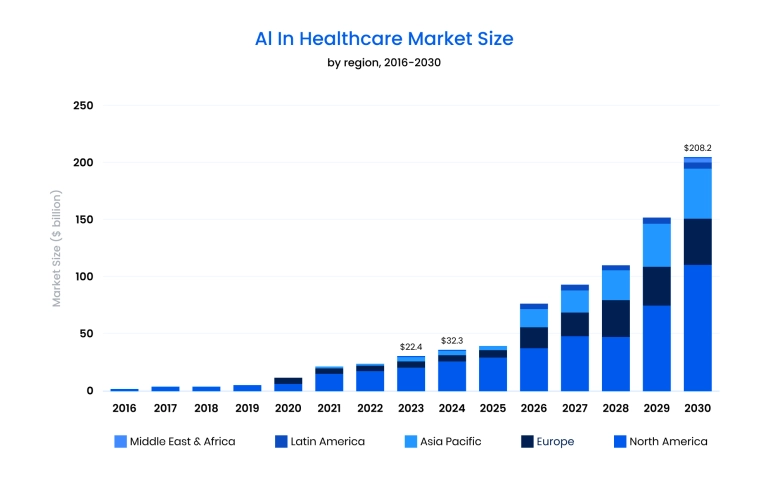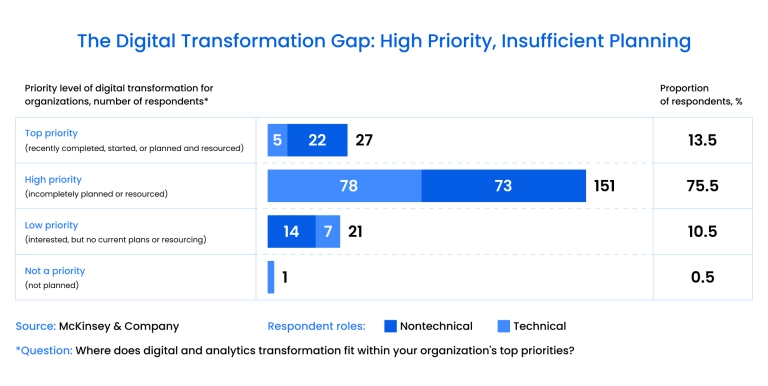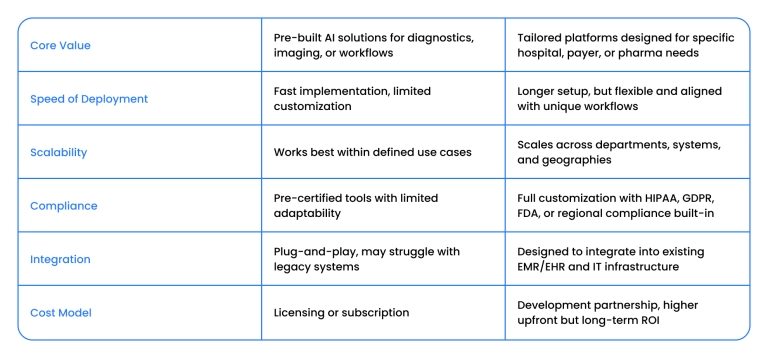Artificial intelligence has moved from a research experiment to a critical backbone of modern healthcare. Healthcare AI companies today are building tools that can detect diseases earlier, reduce operational bottlenecks, and improve patient outcomes at scale. For decision-makers, the question is no longer whether AI belongs in healthcare but which partner or product can deliver measurable value.
Working with the right partner is not straightforward. Even among the top AI companies in healthcare, offerings vary widely, from imaging and diagnostics startups to large players developing end-to-end clinical decision systems. Hospitals and insurers often face challenges such as:
- Fragmented IT ecosystems that make adoption complex
- Lack of trust due to data security and patient privacy concerns
- Long ROI timelines that demand careful vendor selection
Forbes recently reported that AI could save the US healthcare system up to 0 billion annually by 2026, primarily through efficiency gains and sharper diagnostics. Yet, the execution gap remains: many providers still struggle to align AI investment with clear business outcomes.
To make this guide practical, we'll cover two sides of the market:
- Product companies: purpose-built platforms from established AI healthcare companies like DeepMind, Tempus, and Caption Health.
- Service providers: expert development partners, including our own role as a healthcare AI development company, capable of tailoring solutions for hospitals, pharma, and insurers.

The global artificial intelligence healthcare market reflects the urgency of these choices. Valued at $26.6 billion in 2024, it's forecasted to hit 7.7 billion by 2030, growing at a staggering CAGR of 38.6%. This pace makes early adoption not just an advantage, but a survival strategy for healthcare providers competing on outcomes and efficiency.
Why AI matters in healthcare
Artificial intelligence is redefining how care is delivered and managed. AI healthcare companies are building solutions that improve diagnostics, automate workflows, and reduce operational waste in hospitals and insurance systems. The scale of adoption shows that AI is no longer experimental but a strategic driver of efficiency and patient outcomes.
According to McKinsey, AI adoption could generate 0 billion to 0 billion in annual savings for US healthcare. These savings come from automation in prior authorization, revenue cycle management, and faster clinical decision-making. Healthcare providers also report diagnostic error reductions of up to 30% when using AI systems, especially in imaging and oncology.

Key areas where top healthcare AI companies are already creating measurable impact include:
- Diagnostic accuracy improvements in radiology, oncology, and cardiology
- Workflow automation that reduces administrative overhead by up to 30%
- Predictive analytics for patient readmission, staffing, and drug discovery
- Scheduling and patient throughput increase across hospitals and clinics
As outlined in our article on AI in healthcare market , hospitals using machine learning for scheduling achieved double-digit efficiency gains, while pharmaceutical firms shortened drug development cycles by several years. These results explain why medical AI companies are securing record levels of investment as adoption accelerates.
Top healthcare AI companies
Product-first AI medical companies are driving some of the most impactful innovations in diagnostics, imaging, drug discovery, and workflow automation. Below are the leading names shaping the sector, with their technology focus, customer segments, and success stories.
PathAI
PathAI is one of the most recognized names in digital pathology. Its platform enhances the work of pathologists by applying machine learning to tissue sample analysis, reducing human error and enabling more consistent results. By focusing on cancer diagnostics, the company tackles one of healthcare’s most costly and life-threatening challenges.
PathAI also collaborates extensively with pharmaceutical firms on biomarker discovery, helping accelerate clinical trials by identifying eligible patients more accurately. This dual positioning, clinical diagnostics and pharma research, makes PathAI a unique medical AI company with both B2B and patient-focused impact.
Key contributions include:
- AI-powered pathology workflows that reduce diagnostic errors;
- Partnerships with Bristol Myers Squibb and Labcorp for clinical research;
- Tools that optimize biomarker identification for oncology drug development.
Tempus
Tempus built its reputation around a massive library of molecular and clinical data, positioning itself as a leader in precision medicine. Its AI models process genomic sequencing data to guide oncologists in choosing personalized treatments, addressing one of the most urgent needs in cancer care.
The company's strength lies in integrating structured and unstructured data from electronic health records, which allows clinicians to see patterns across millions of cases. With partnerships spanning half of US oncologists, Tempus continues to expand into cardiology and neurology, where predictive modeling can improve outcomes and lower costs.
Notable milestones:
- Development of AI models predicting patient response to therapies;
- Partnerships with over 50% of US oncologists;
- Expansion into cardiology and neurology with predictive modeling.
DeepMind (Google Health)
DeepMind, part of Google Health, is synonymous with cutting-edge medical imaging and scientific research breakthroughs. Its breast cancer screening AI achieved radiologist-level accuracy, showing how machine learning can reduce false positives and negatives, an enormous issue in oncology.
The company also made headlines with its protein folding research, where its AlphaFold system solved decades-old biological puzzles, giving pharmaceutical firms a powerful tool for drug discovery. In clinical care, its collaboration with Moorfields Eye Hospital in London demonstrated how AI could detect retinal diseases earlier and with higher precision than manual screening.
DeepMind's success highlights how AI healthcare software development companies can scale innovation globally.
Impactful projects include:
- AI for early breast cancer detection, reducing false positives and negatives;
- Collaboration with Moorfields Eye Hospital on retinal disease detection;
- Deployment of AI tools for protein folding research, supporting drug discovery.
Caption Care
Caption Health focuses on democratizing access to ultrasound diagnostics. Its FDA-approved Caption AI system allows clinicians with minimal training to capture high-quality images, which are critical in cardiac care and emergency medicine, where time is a constraint. The company is now recognized among the most innovative AI companies in healthcare, particularly for improving access to imaging in settings that traditionally lack specialists.
The technology reduces reliance on highly trained staff and expands ultrasound use in smaller clinics and rural hospitals. With support from the American College of Cardiology and major device manufacturers, Caption Health has become a trusted healthcare AI company that transforms diagnostic workflows outside traditional care environments.
Organizations exploring advanced imaging can also benefit from tailored healthcare solutions that integrate seamlessly with platforms like Caption AI, ensuring providers capture both efficiency gains and clinical accuracy.
Core achievements:
- Caption AI system for real-time ultrasound guidance;
- Partnerships with the American College of Cardiology and Butterfly Network;
- Impact on cardiac care in remote and resource-constrained settings.
Freenome
Freenome applies AI to blood-based diagnostics, aiming for early cancer detection with non-invasive tests. Its flagship work in colorectal cancer has demonstrated that combining machine learning with advanced genomics can detect cancers at earlier stages, when survival rates are significantly higher. This positioning makes Freenome one of the most promising artificial intelligence healthcare companies focused on preventive medicine.
The company is also building partnerships with major research institutions and regulators, placing itself at the intersection of biotech and AI. With substantial backing from investors like Google Ventures and RA Capital, Freenome is frequently ranked among the best AI healthcare companies, reflecting strong confidence in its ability to make large-scale cancer screening affordable and accessible.
Notable developments:
- Blood tests capable of detecting colorectal cancer at early stages;
- Clinical trials in collaboration with the FDA and large hospital networks;
- Strong venture funding from investors like Google Ventures and RA Capital.
Together, these top medical AI companies represent the cutting edge of diagnostics, imaging, biotech, and accessibility. For providers deciding between ready-made platforms and tailored systems, the choice depends on their long-term strategy.
Custom projects often demand expertise beyond product vendors. Partnering with a proven AI development services provider allows hospitals, insurers, and pharma firms to design scalable, compliant solutions aligned with their workflows.
Criteria for selecting a healthcare AI company
Choosing the right partner is as critical as the technology itself. Not all top healthcare AI companies serve the same purpose: some provide ready-to-use diagnostic tools, while others focus on custom development and integration. Hospitals, insurers, and pharma firms should weigh technical expertise, compliance, and scalability before committing.
Below is a structured comparison between product-first vendors and service-focused providers respectively:

Decision-makers often start with product companies to test feasibility, then engage a healthcare AI development company when broader, enterprise-wide adoption is required. This dual approach reduces risk while allowing innovation to scale.
Benefits of collaborating with AI healthcare companies
Partnering with healthcare AI companies brings measurable results that directly impact both patients and providers. Hospitals, insurers, and pharma firms are adopting AI for innovation and operational survival in strained healthcare systems.
Key advantages include:
- Operational efficiency: AI reduces bottlenecks in billing, triage, discharge, and other admin-heavy tasks.
- Improved accuracy: Tools from leading medical AI companies reduce diagnostic errors and support earlier intervention.
- Cost savings: Automation can cut overhead costs by double digits, while improving resource allocation.
- Expanded access: AI solutions extend specialist-grade care to rural and underserved regions.
- Enterprise scalability: Custom systems from AI healthcare development companies ensure compliance with HIPAA, GDPR, FDA, and local standards.
Real-world impact: AI agent workflow automation
A healthcare technology provider serving mid-sized clinics and hospitals needed to transform their manual, time-intensive clinical workflows. It partnered with Binariks to develop an agentic AI platform for automating scheduled check-ins, documentation, and task reminders.
Before AI
Healthcare staff manually handled all documentation, check-ins, and task reminders. This consumed significant portions of their shifts, created inconsistent follow-ups, and frequently led to missed scheduled actions and workflow disruptions.
After AI
Custom AI agent platform automated routine communications and documentation processes:
- 30% reduction in follow-up documentation time through AI-powered automated interactions
- 2x increase in task completion compliance for AI-managed scheduled check-ins
- AI agents handling repetitive communication flows independently
- Automated reminders and structured documentation replacing manual processes
This AI transformation allowed medical professionals to focus on patient care while intelligent agents managed the administrative workload with greater consistency and reliability than manual processes.
Top AI development companies with healthcare experience
While product-first vendors offer ready-made tools, enterprises often need tailored solutions. This is where AI healthcare software development companies come in, building custom AI platforms that fit complex clinical, insurance, and pharma workflows.
Binariks

Binariks is a global software engineering firm recognized as one of the most reliable AI healthcare development companies. Founded in 2016, they have delivered over 60 healthcare projects and 30+ AI projects, specializing in custom AI solutions for hospitals, digital health and DTx companies, and pharmaceutical organizations.
With ISO 13485 certification – the international standard for medical device quality management – the company meets the stringent regulatory requirements essential for developing software used in medical devices and clinical applications.
Binariks' AI Center of Excellence (CoE) provides a structured, expert-led framework that transforms AI from isolated experiments into scalable, business-aligned healthcare solutions while enabling 50% faster engagement.
Unlike product-based vendors, Binariks customizes systems to fit existing infrastructure of hospitals, insurers, and pharmaceutical companies. Their specialized approach addresses four critical success factors that set them apart from other companies using AI in healthcare:
1. Enterprise-grade trust & QA
Multi-layer verification process:
- Serious QA procedures with expert verifications at every development stage
- Subject Matter Expert (SME) reviews required for any deviation from standards
- Built-in code-level guards that verify intermediate results
- Mandatory expert review triggers for quality control
Regulatory compliance:
- HIPAA, GDPR, and FDA standards compliance built-in
- Comprehensive risk assessments for each implementation
- Certified ethical AI practices tailored to healthcare requirements
2. Legacy system integration expertise
Legacy limitations don't have to prevent AI adoption.
Binariks' approach:
- Third-party AI copilot implementation alongside existing systems
- Integration solutions that work around older or proprietary systems
- Standards-based approaches (like FHIR) for interoperability
- Proven experience with highly-regulated industries requiring legacy system compatibility
No costly system overhauls required.
3. Comprehensive training & knowledge transfer
Staff enablement and maintenance support:
- Personnel training on AI agent usage
- Thorough handover procedures for sustainable adoption
- Well-documented, maintainable solutions
- Dedicated contact person availability when needed
4. Value-driven, cost-effective implementation
Strategic process analysis:
- Comprehensive evaluation of current processes
- Business Value vs. Implementation Cost assessment
- Collaborative solution selection with clients
- Identification of high-impact opportunities first, no requirement for "all-in" investments
Organizations aiming to build custom solutions beyond off-the-shelf platforms can leverage Binariks' expertise to accelerate digital transformation with long-term scalability. As one of the best healthcare AI companies, Binariks continues to set the standard for excellence in medical technology innovation.
Accenture

Accenture is one of the largest professional services firms investing heavily in AI for healthcare. It combines strategy, technology, and operations expertise to help hospitals and payers implement AI at scale. Its healthcare practice covers automation, digital twins, and AI-driven population health management.
Accenture’s size allows it to deploy multi-disciplinary teams across global healthcare systems. The company’s focus is on designing strategies for enterprise-wide adoption while aligning with strict compliance and governance requirements.
IBM Watson Health (Merative)

IBM Watson Health was among the first medical artificial intelligence companies, pioneering natural language processing for oncology and clinical decision support. After the divestiture of Watson Health to Merative, IBM still maintains strong capabilities in data analytics and AI for life sciences.
The company continues to focus on enabling providers and insurers with data-driven tools. Its AI platforms assist clinicians with diagnostics, improve insurance workflows, and help pharma companies analyze complex trial datasets.
Deloitte

Deloitte leverages its global consulting expertise to deliver healthcare AI solutions focused on efficiency and compliance. The firm is known for helping healthcare organizations implement AI responsibly, with attention to governance and ethical use.
Its healthcare AI work centers on automation of back-office processes, clinical risk prediction, and helping clients navigate regulatory frameworks. Deloitte also advises payers and providers on scaling AI adoption while balancing ROI expectations.
EPAM Systems

EPAM Systems provides large-scale engineering and digital platform development, positioning itself among healthcare IT companies with a strong AI practice. The company partners with healthcare providers and life sciences firms to build data-driven systems for patient care and operational efficiency.
Its strength lies in combining AI with cloud-native platforms, enabling scalability across multiple geographies and healthcare settings. EPAM has been especially active in developing patient-facing apps and insurance automation solutions.
How to choose the right AI development partner
Selecting a development partner requires different priorities than choosing product-first vendors. A reliable AI healthcare company should have technical expertise and a track record of delivering compliant, scalable solutions in clinical and operational settings.
Key factors to evaluate include:
- Proven healthcare experience: Review case studies from hospitals, pharma, and insurers to ensure the partner understands clinical workflows.
- Regulatory readiness: The best partners design with HIPAA, GDPR, and FDA compliance from day one.
- Integration capability: Strong expertise in connecting AI platforms with EHR/EMR systems, claims software, or IoMT devices is critical.
- Scalability and security: Solutions should handle growth across multiple facilities while maintaining enterprise-grade security.
- Clear delivery model: A trustworthy partner provides transparency in data handling, timelines, and pricing.
When selecting an AI healthcare development company, decision-makers should weigh not just the cost of building the software but the long-term ability of the partner to ensure adoption, compliance, and measurable ROI.
Future trends in AI-powered healthcare
The future of healthcare is being shaped by healthcare artificial intelligence companies moving beyond diagnostics into large-scale transformation. According to the recent Healthcare AI Trends Report , the biggest advances are happening in three areas:
- Drug discovery: AI is compressing pharmaceutical R&D timelines, with platforms already delivering drug candidates that reach clinical trials in a fraction of the traditional time.
- Predictive analytics: Hospitals are adopting machine learning to anticipate patient deterioration and reduce readmissions, improving both patient safety and cost efficiency.
- Generative AI in workflows: Clinicians are increasingly relying on AI tools to draft clinical documentation and discharge summaries, saving valuable hours that can be redirected to patient care.
These trends underline the shift from AI as a niche tool to AI as an enterprise-wide enabler. The organizations that partner early with advanced AI providers will cut costs and redefine patient outcomes at scale.
FAQ
Share

